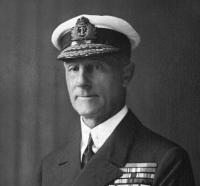
Admiral John Jellicoe
The Battle of Jutland, which was fought 100 years ago today, was one of the greatest modern sea battles and arguably, changed the course of World War I. In the battle, 250 ships, manned by 10,000 sailors fought for 12 hours. The battle was fought between the British Royal Navy’s Grand Fleet under Admiral Sir John Jellicoe, against the Imperial German Navy’s High Seas Fleet under Vice-Admiral Reinhard Scheer in the North Sea, near the coast of Denmark’s Jutland Peninsula. After the battle, both sides claimed victory. The British lost more ships and men than the Germans, who claimed a tactical victory. The battle was, however, a clear strategic defeat for Germany, proving that the Imperial German Navy could not defeat the Royal Navy nor lift the naval blockade that was slowly starving Germany.
While the British are generally acknowledged as victors of the battle, there remains considerable controversy over the naval commanders, particularly the role played by Admiral Jellicoe. Some have claimed that if Admiral Jellicoe had acted more aggressively that he might have cut off the German navy before it could flee back to port. Others argue that Jellicoe acted prudently from a position of strength.
The Royal Navy Jutland website falls just slightly on the “Jellicoe was too cautious” side of the argument: “While the British public had been reared to expect a 20th Century Trafalgar, the man in charge of the Grand Fleet had no intention of risking his warships unnecessarily. Admiral Sir John Rushworth Jellicoe was hailed by newspapers as a modern-day Nelson. He wasn’t. He lacked Nelson’s flair and imagination – and willingness to delegate.”
Nick Jellicoe, the Admiral’s grandson, makes the counter argument: “I seriously doubt that, under the conditions that day, a Nelson would have done any better. He knew that a failure at Trafalgar only risked a third of British naval assets, whereas Jellicoe was, in Churchill’s famous words, “the only man on either side who could have lost the war in an afternoon”. The entire complement of British first-line ships was deployed at Jutland, and both sides were fighting with new and mainly untried technologies – long-range gunnery, fire control systems, torpedoes, mines, new ship designs. The stalemate at Jutland convinced the German high command that they could never win a fleet-to-fleet action. Instead, they aggressively resumed unrestricted submarine activity as the only chance of winning a war bogged down on the western front.”
Here are two excellent videos about the Battle of Jutland. The first, “The Battle of Jutland Explained” is a quick two-minute summary produced by Ministry of Defence for the centennial. The second, The Battle of Jutland, is a 24 minute documentary, which looks at the battle in much greater detail, including Jellicoe’s role in the outcome.

Another interesting aspect:
http://www.bbc.co.uk/guides/zqhxvcw
Appreciate the balanced way you presented the positions on Jutland. I found the royal Navy site beyond belief given the amount of scholarship on Jutland.